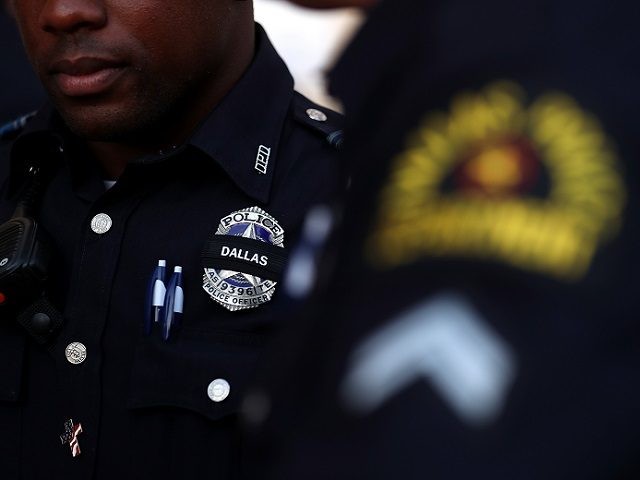The Dallas Police Association president said a shootout on Saturday night is just part of the “emboldenment of the criminal.” This “lawlessness,” he says, has been caused by policies of Dallas County and unaccountable judges.
To make matters worse, the association president warns, Dallas City Manager T.C. Broadnax implemented “immediate police reform policies” requiring that effective June 12, police officers must warn a suspect before they discharge a weapon.
Bad policies do not stop with city officials, Dallas Police Association president Michael J. Mata told Breitbart Texas. He explained that approximately “1,200 offenders have been let out the door” by local judges. Mata reported that “lots of these were repeat and violent offenders.”
On Saturday evening, officers in Dallas received a call about 6:45 p.m. regarding an active shooter situation on Glenview Court. Minutes later, 911 dispatchers received another call about gunfire at the intersection of South Buckner Boulevard and CF Hawn Service Road.
The driver of a white truck got out of his vehicle and shot at a Dallas police officer sitting in his patrol car on Buckner, according to official reports. The officer returned fire and struck the suspect in the lower abdomen and in his leg. The Dallas PD’s Media Relations Unit reported that the officer was not injured, and the suspect is in stable condition.
The Dallas Morning News Editorial Board published an article in January entitled: “Dallas needs bail reform, but not a policy that puts violent offenders back on the streets.” The piece said, “This type of bail reform drives toward the uncritical release, on outrageously low bonds, of people accused of violent crimes who have a history of violent behavior.”
Mata reported there had been a dramatic increase in murders and aggravated assaults in the city since the implementation of bond reform and jail releases. He said the rise in numbers is “on par if not higher with the same problems all cities are having.”
And now there is the “Warning Before Shooting Policy,” that Dallas officials will implement June 12. Mata said officers must warn a suspect or detainee before firing a weapon at the person.
The head of the union representing more than 4,000 active and retired Dallas police officers said the reality is that most of the time, there are five to seven feet between the officer and the subject, and officers only have seconds to react.
On June 4, Dallas officials also ordered the implementation of a duty-to-intervene policy. “The police compels DPD members ‘to either stop or attempt to stop, another employee when force is being inappropriately applied or is no longer required.'” Mata said he “has no problem” with the policy, but he believes that the issue is one of integrity, and giving proper due process. “You should not have to be told to do that.” He added that officers already have two to three classes in the academy to this effect.
On June 3, a training bulletin was issued which restated the department’s ban on neck restraints. Mata explained the policy has been in place since 2004. Chokeholds have not been sanctioned by DPD since the 1980s.
By June 30, DPD will create and implement a body and dashcam policy to release critical incident videos. These include officer-involved shootings. Mata expressed concern that doing so would taint grand juries and jury pools. He said, “I think it is a violation of due process. Get ready, there will be a lot of change of venues.”
Mata told Breitbart Texas that the new policies are a “knee-jerk reaction without a lot of substance or thought.” He added, “Protesters expect substance. Real improvements are not made overnight.”
The police union president said his officers respond to about a million calls for service in a year. The decrease in the department’s ability to hire officers has caused challenges. Personnel deficits hinder “proactive policing, directive patrols, and aggressive narcotic units.”
During the interview, the law enforcement representative said another problem is that people do not want to be officers anymore. He says there was a huge gap — 1,000 short — that got down to about a 650 officer shortfall in the city.
Mata is also concerned that COVD-19 cuts will bring a likely freeze to police academy graduates. Given that fact and considering police retirements, he is afraid that shortages will worsen.
Lana Shadwick is a writer and legal analyst for Breitbart News. She is a trial lawyer who previously served as a prosecutor and family court associate judge in Texas. You can reach Shadwick at Lana@LanaShadwick.com.

COMMENTS
Please let us know if you're having issues with commenting.